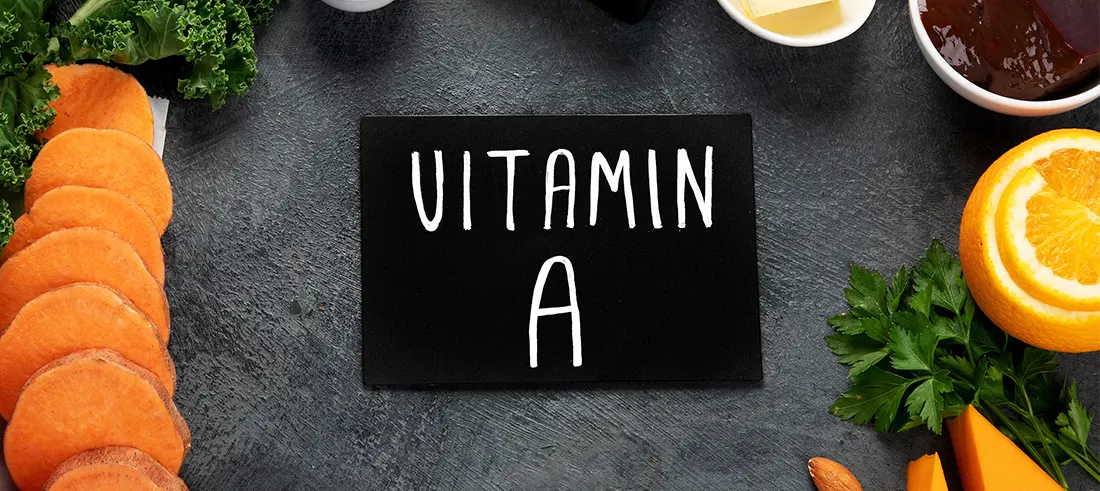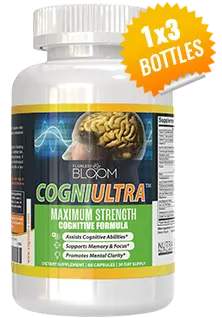Vitamin A for brain health is something more people are starting to pay attention to as research uncovers its impact on memory, focus, and cognitive function.
But how does Vitamin A actually contribute to brain health? And how can you get more of this essential vitamin?
In this article, we will explore the benefits of Vitamin A for memory, look into natural sources of Vitamin A, and why supplements might be something you should consider if you’re looking to support your brain.
Let’s take a detailed look at the connection between Vitamin A and cognitive health.
How Vitamin A Supports Brain Health
Vitamin A performs a much bigger function in the brain than many people realize. It influences various cognitive functions and general brain performance.
Here’s a closer look at how Vitamin A supports brain health:
- Neuroprotection: Vitamin A is essential in protecting the structure and function of the brain. It helps preserve neurons from damage. When the building blocks of your brain are well-protected, you can enjoy long-term brain health and a reduced risk of neurodegenerative conditions.
- Memory and Learning: One of the most notable benefits of Vitamin A for memory is its role in memory retention and learning. It has been shown that adequate levels of Vitamin A can improve memory and enhance the brain’s capacity to process and store information. This means a healthy intake of Vitamin A can help you focus better, recall information more easily, and possibly even improve academic or work performance.
- Mental Clarity: If you often feel mentally foggy or distracted, Vitamin A might be just what your brain needs. This nutrient is essential for proper brain signaling, it can lead to improved focus and mental clarity. With regular Vitamin A for memory and focus, you can stay sharp and clear-headed.
Sharpen Your Focus And Mental Clarity With Vitamin A Today!
Natural Sources of Vitamin A
Vitamin A is one of the best nutrients for supporting brain health. This is why getting enough of it from natural sources is highly beneficial. Adding foods rich in Vitamin A into your diet can provide added advantages, especially in boosting general brain performance.
Here are some natural sources of Vitamin A:
- Carrots: Carrots are widely known for being a rich source of beta-carotene (a precursor to Vitamin A). Consuming carrots can help your body produce more Vitamin A, and so support brain health.
- Sweet Potatoes: Sweet potatoes are loaded with beta-carotene. This root vegetable is not only delicious but also a powerful source of Vitamin A that helps maintain memory and cognitive function.
- Spinach: This leafy green is another good source of beta-carotene. It is rich in nutrients that support both brain health and general well-being. Adding spinach to your meals helps boost your Vitamin A intake naturally.
- Liver: Animal liver, particularly beef or chicken liver, contains a high concentration of preformed Vitamin A. This type of vitamin A is directly available without the body needing to convert it from beta-carotene.
- Eggs: Eggs, especially the yolks, are an excellent source of Vitamin A. They provide fat and Vitamin A in a form that’s easy for your body to absorb and use.
When to Consider Vitamin A Supplements
While it’s always best to get nutrients from food, some people may not be able to meet their Vitamin A needs through diet alone. In these cases, Vitamin A supplements for brain function can be a helpful option to ensure you’re getting enough of this vital nutrient.
You may want to consider supplements in the following situations:
Dietary Restrictions:
If you follow a restrictive diet, such as vegetarian or vegan, you may have a harder time getting enough Vitamin A from plant-based sources alone. In these cases, a supplement can help fill the gap, especially if you’re not consuming animal products like liver or eggs that are rich in preformed Vitamin A.
Poor Absorption:
Some medical conditions or medications can affect your body’s ability to absorb Vitamin A properly. If you have conditions like celiac disease or certain digestive disorders, you might not absorb nutrients as efficiently. This makes supplements a good option to maintain adequate levels.
Age and Cognitive Function:
As you age, your ability to absorb nutrients may decline. Vitamin A is essential for maintaining cognitive function, so if you notice changes in your memory or focus, it may be best to consult a healthcare professional for supplements.
Signs of Deficiency:
If you’re experiencing symptoms like dry skin, night blindness, or trouble concentrating, it could be a sign that your body is lacking in Vitamin A. In these cases, supplements can help restore your levels and support overall brain health.
Strengthen Your Mind With Vitamin A-Rich Foods And Supplements!
Potential Risks and Side Effects
While Vitamin A is essential for brain health, it’s important to be aware of potential risks and side effects, especially if taken in excess. Overconsumption of Vitamin A can lead to toxicity and may cause harm to the body.
Here are some key considerations when taking Vitamin A supplements:
- Toxicity Risk: Taking too much Vitamin A (particularly in the form of retinol) can lead to Vitamin A toxicity, also known as hypervitaminosis A. Symptoms can include dizziness, nausea, headaches, and even more severe effects like liver damage or bone fractures. It’s important to follow the recommended daily intake to avoid this risk.
- Pregnancy Concerns: High levels of Vitamin A during pregnancy, particularly from supplements, can harm a developing fetus. Pregnant women should consult with a healthcare provider before taking any Vitamin A supplements to ensure they are taking safe amounts.
- Interactions with Medications: Some medications, such as certain antibiotics and cholesterol-lowering drugs, can interact with Vitamin A. If you’re taking medications, it’s essential to discuss with your doctor whether Vitamin A supplements are appropriate for you.
- Vitamin A Deficiency: Although deficiency in Vitamin A is rare in developed countries, it can still occur, especially in individuals with poor dietary habits or absorption issues. If you’re concerned about Vitamin A deficiency and cognitive decline, a healthcare provider can conduct tests and guide you on whether supplementation is needed.
FAQs
What is the best source of Vitamin A for brain health?
Natural sources like carrots, sweet potatoes, spinach, and liver are excellent for providing Vitamin A to support brain health. Supplements can also help if dietary intake is insufficient.
Can Vitamin A improve memory?
Yes, Vitamin A for memory helps enhance cognitive function and improves memory retention. It also supports brain health and neuron protection.
Is it safe to take Vitamin A supplements daily?
Taking Vitamin A supplements for brain function is generally safe when taken in the recommended amounts. However, excessive intake can lead to toxicity, so it’s best to consult a healthcare provider.
How much Vitamin A should I take for brain health?
The recommended daily allowance (RDA) for Vitamin A varies by age and gender. For adults, it’s about 900 mcg for men and 700 mcg for women. Consult a healthcare provider for personalized advice.
Can Vitamin A help with focus?
Yes, Brain-boosting supplements with Vitamin A can help improve focus and mental clarity. Especially if you have a deficiency or difficulty absorbing this nutrient from food.
What are the signs of Vitamin A deficiency?
Symptoms of Vitamin A deficiency include night blindness, dry skin, and poor cognitive function. If you notice these symptoms, it’s important to seek medical advice.
Conclusion
Vitamin A is essential for supporting brain health, memory, focus, and all-round cognitive function. It protects the brain from damage, aids memory retention, and enhances mental clarity.
While natural food sources like carrots, sweet potatoes, and spinach can provide a good amount of Vitamin A, supplements can be beneficial if you have dietary restrictions or need additional support.
However, it’s important to use Vitamin A supplements for brain function with care, as excessive intake can lead to toxicity. With a balanced diet that ensures you get the right amount of Vitamin A daily, you can effectively support brain health and improve cognitive performance over time.




